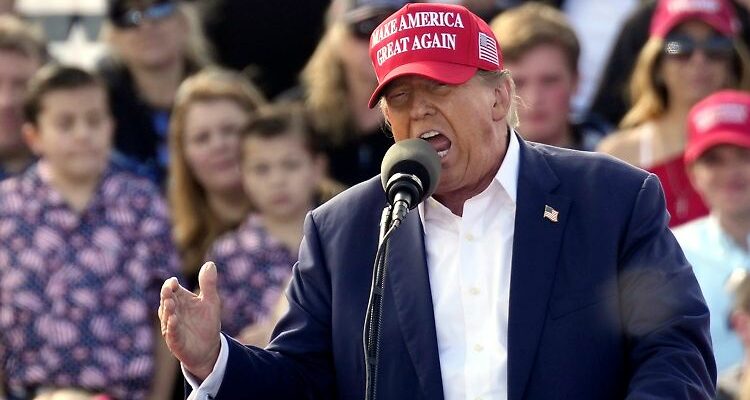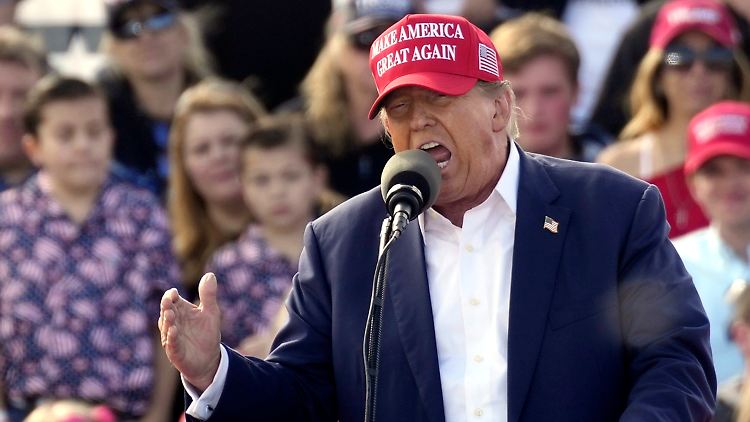Biden praises himself, Trump complains
USA imposes strictest regulations on auto industry ever
By Roland Peters, New York
March 20, 2024, 9:14 p.m
Listen to article
This audio version was artificially generated. More info | Send feedback
With China breathing down its neck, the US government is imposing the strictest environmental regulations ever on its own auto industry. It is supposed to herald the end of the combustion engine. Trump has other ideas – and is rabid against President Biden.
Eight more years until the restructuring of the auto industry in the USA will be complete. The US Environmental Protection Agency (EPA) has imposed corresponding emissions regulations. Never before has a US government intervened so strongly: According to this, stricter carbon dioxide limits will now apply to manufacturers’ total production from 2027, with a timetable until 2032. Pollutant emissions will then have been halved. In order to meet the requirements, around 60 percent of all new cars would have to be fully electric by 2032. This proportion can also be lower due to the sale of hybrid cars or other drive technology. Included in the regulation are regular cars, SUVs and most pickup trucks.
US President Joe Biden is also imposing one of the strictest environmental regulations ever by regulating emissions. His administration had been working on this since the Democrat took office. The transport sector is responsible for the largest share of carbon dioxide emissions, which in turn drives global warming. The United States is the world’s largest polluter after China. Biden has set a goal of halving pollutant emissions in the United States by the end of the decade and becoming carbon neutral by 2050. The drastic regulation of the auto industry would be by far the most important part of this. But many expect that the fossil energy industry will defend itself legally and that the Republicans will take political action against it.
What sounds like responsible politics in view of the weather extremes and forecasts of the consequences of climate change is far from social consensus. The Inflation Reduction Act of 2023 is already highly controversial because of its subsidies for renewable energies; despite the approximately $200 billion in new industrial investment that according to the New York Times have been stimulated by the legislative package. In addition to subsidies for companies, this also includes tax discounts for consumers who buy electric cars, heat pumps or other energy-efficient systems.
The explosive dispute over the future of the auto industry is part of the presidential election campaign. After the announcement, Biden himself praised the new requirements for the auto industry in a video because they would help achieve climate goals. Donald Trump, on the other hand, complained during an appearance at the weekend that if he were not elected in November, his opponent would cause a “bloodbath for the country.” He was apparently referring to plans by Chinese car manufacturers to have their models for the US market manufactured in Mexico. Trump instead called for protectionism to protect his own auto industry: a drastic 100 percent tariff on imported cars. In his first term in office, he renegotiated the NAFTA free trade agreement between Canada, Mexico and the USA, which was decried as a job killer; it has since been called USMCA.
Slower sales, high savings potential
First, last year the environmental agency proposed a target of 67 percent electric cars by 2032, whereupon corporations, suppliers, dealers and unions called for a slower implementation of the goals. The regulation now presented is a result of these negotiations. The most powerful auto union, the United Auto Workers (UAW), is on the Democratic side in the presidential election campaign. She had previously pushed through significant wage increases in a historic strike with Biden’s support. However, trade unionists fear that jobs will be cut due to the switch to electric car production. The state of Michigan, with its auto industry in and around Detroit, is one of the keys to an election victory.
If car manufacturers meet the goals of the new requirements, the environmental agency predicts extensive consequences: around $100 billion in costs would then be saved annually, including $13 billion in state health benefits due to the consequences of air pollution. An average American driver would also save around $6,000 over the lifespan of an electric car compared to a combustion engine. The basis of regulation is the Clean Air Actthe Clean Air Act.
The US auto industry is under enormous competitive pressure from China. At the same time, sales of electric cars in the USA have recently declined, which may be another reason why Biden’s government relaxed the originally more ambitious limits somewhat. In the USA, 1.2 million electric vehicles rolled off the assembly line last year, more than ever before; but they only accounted for 7.6 percent of sales. Many Americans are interested in electric cars but worry that they either won’t be able to find charging stations or that it will take too much time. In addition, equivalent combustion engines are often cheaper to purchase.
The fossil fuel industry is fighting back
The fossil energy industry is already trying to discredit the new requirements with advertising campaigns. The lobbying organization “American Fuel & Petrochemical Manufacturers” calls the EPA regulations “Biden’s car ban” and has them published in the most important states for a possible re-election. However, car manufacturers can decide for themselves how they meet the requirements, so the advertising is misleading. Companies can also sell hydrogen cars, hybrid cars, and even purchase CO2 certificates from other manufacturers that exceed the requirements.
If the fossil energy industry or others sue against the requirements, the question of the authority of the environmental agency EPA could ultimately be decided by the Supreme Court. Its judges are predominantly conservative. “There is a limit to their ability to change society according to their own ideas,” said the attorney general of the state of Louisiana in the New York Times. quoted. The oil and gas industry has a lot of influence in Louisiana; The state has already taken legal action against the EPA several times under Biden.
If Trump wins the presidential election in November, the Republicans will also gain control of the Environmental Protection Agency and could have the requirements removed again. According to a lobbying group for the fossil energy industry, the Republicans are also targeting tax breaks. Trump repeatedly emphasizes that he wants to increase the production of fossil fuels and also complains about electric cars. During his first term in office from 2016 to 2020, the authority deleted a large number of environmental protection regulations. But even if Biden remains in power, if the climate goals are to be achieved, drivers will have to participate – and in eight years they will have to buy ten times as many electric cars as they currently do.


